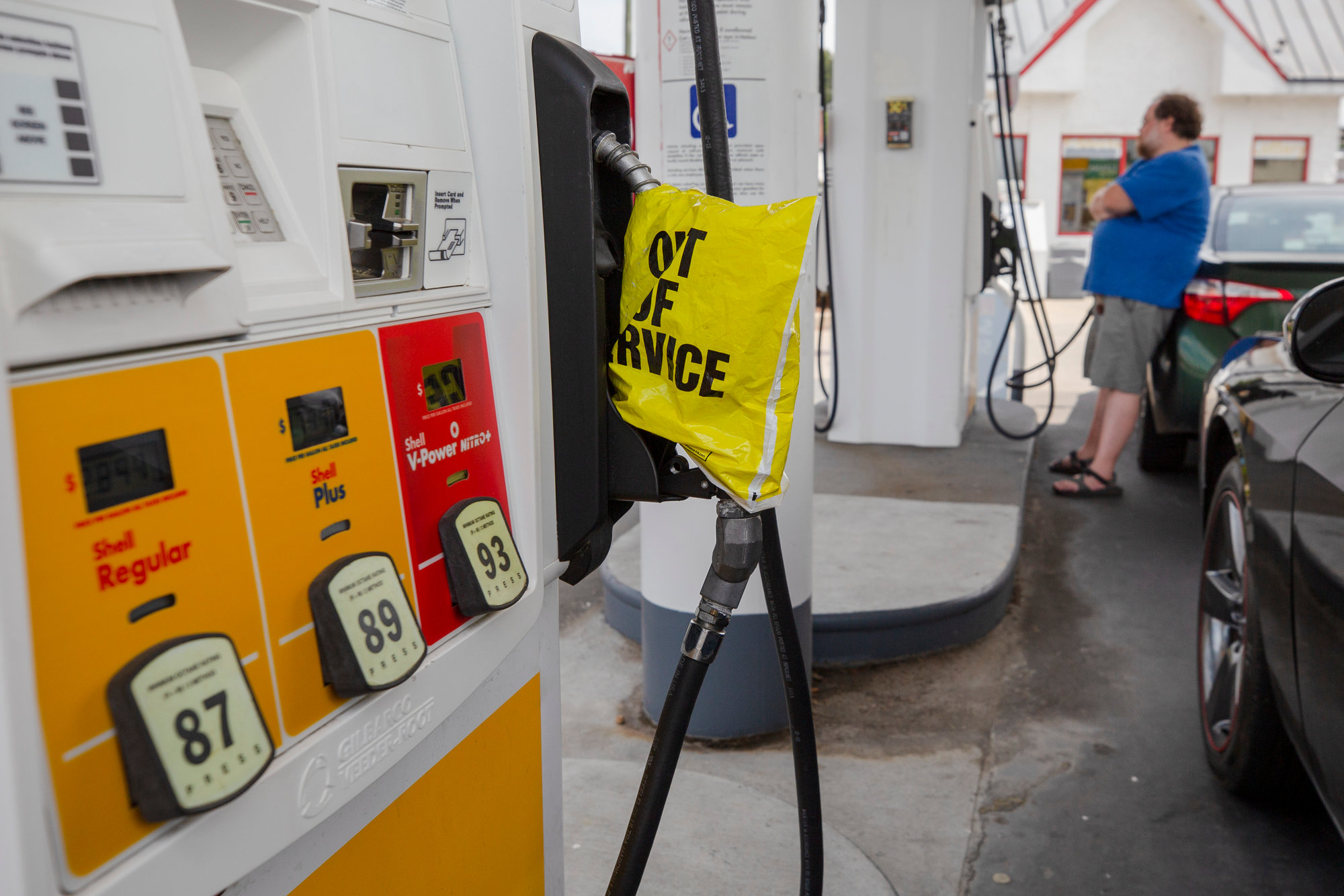Gas crunch continues across much of U.S. after pipeline hack
CLEMMONS, N.C. (AP) — Gas pumps remained shrouded by plastic bags Thursday at thousands of service stations across more than a dozen U.S. states, but the situation could improve as a pipeline company reported "substantial progress" in restarting the supply line.
Nearly 70% of North Carolina's gas stations were still without fuel, as were about half the stations in South Carolina and Georgia, GasBuddy.com reported. Drivers on the East Coast were also having trouble, with more than half the stations tapped out in Virginia and Washington, D.C., the site's tracking service showed.
In a Thursday update, Georgia based-Colonial Pipeline said gasoline delivery is now underway in most of its markets.
The pipeline stretches from Texas to New Jersey, but the northeastern U.S. has seen fewer disruptions since those states are supplied more by other sources such as ocean tankers.
Gas is flowing again across most of the Deep South, and other parts that were offline in the Mid-Atlantic region were expected to become operational later Thursday, the company said.
"We are not out of the woods yet, but the trees are thinning out," Richard Joswick, global head of oil analytics at S&P Global Platts said in an email. He estimates that full recovery for the East Coast and Gulf Coast will take a couple of weeks at least due to lags and limits for all shipping options.
The cybersecurity attack on the Colonial Pipeline forced a temporary shutdown of the nation's largest fuel pipeline, prompting panic-buying and long lines that quickly wiped out supplies around the southeastern U.S. The company resumed pipeline operations late Wednesday, but said it would take several days for deliveries to return to normal.
In Virginia, the run on gas prompted an urgent warning Thursday that people should never siphon gasoline after calls in recent days about people being poisoned.
There have been a handful of cases in the region covered by the Blue Ridge Poison center at UVA Health, including a significant one Wednesday that prompted the warning, said Dr. Chris Holstege, the center's medical director.
A man using an opaque hose to siphon gasoline from a vehicle sucked gasoline right into his lungs, causing significant distress, Holstege said. He is expected to recover and didn't have to go to intensive care, he said.
The governors of both North Carolina and Virginia declared states of emergency to help ensure access. Other governors urged people not to hoard supplies.
"Now that Colonial has restarted pipeline operations, we will see a gradually increasing return to normal conditions that will take several days," North Carolina Gov. Roy Cooper said in a statement Thursday. "There is available fuel supply in and around our state, and it will take time for tankers to move that supply to the stations that are experiencing shortages."
Mary Goldburg, 60, of Norfolk, Virginia, said she needs her car for work but also to see her grandchildren — whom she barely got to see last year. Her job includes delivering T-shirts for events and other promotional products.
"I can't get paid until my customers get their products," Goldburg said at a 7-Eleven.
The Colonial Pipeline delivers about 45% of the fuel consumed on the East Coast. There is no gasoline shortage, according to government officials and energy analysts, just delays in delivering the fuel from Gulf Coast refineries.
The distribution problems have been fraying nerves.
Two people were charged with assault after spitting in each other's faces over spots in a line at a Marathon station in Knightdale, outside Raleigh, on Tuesday afternoon, authorities said.
In Walton County, Georgia, paramedic Jeff Lisle had just under a quarter-tank of gas in his Jeep and found a small amount in the cans he uses for his lawnmower in case he needed the extra boost to get to work.
As for the ambulances he works in, "we have to buy fuel at gas stations like everybody else does," he said. Whenever possible, the ambulances have been stopping to refuel when they're lucky enough to drive past a station with gas.
The shutdown even affected hikers long the Appalachian Trail, which stretches from Georgia to Maine. They depend on cars and vans to access the trail and get supplies.
"Everybody's out here buying from the same gas pumps, so the lines are long, some are out -- you've really got to look for it," said Ron Brown, who operates Ron's Appalachian Trail Shuttles, which takes hikers from Atlanta's airport into the north Georgia mountains.
But he said that hikers are resourceful enough to get where they need to go.
"It will get rectified because it's a big deal, and everybody needs gas," he said. "We'll just make due until it does."
More Articles to Read

